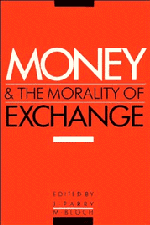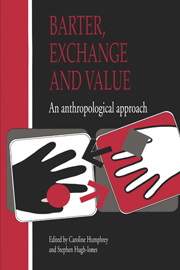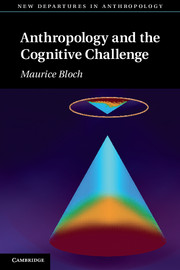Money and the Morality of Exchange
- Editors:
- Jonathan Parry, London School of Economics and Political Science
- Maurice Bloch, London School of Economics and Political Science
- Date Published: April 2011
- availability: This ISBN is for an eBook version which is distributed on our behalf by a third party.
- format: Adobe eBook Reader
- isbn: 9780511875618
Find out more about Cambridge eBooks
Adobe eBook Reader
Other available formats:
Paperback, Hardback
Looking for an inspection copy?
This title is not currently available on inspection
-
This volume deals with the way in which money is symbolically represented in a range of different cultures, from South and South-east Asia, Africa and South America. It is also concerned with the moral evaluation of monetary and commercial exchanges as against exchanges of other kinds. The essays cast radical doubt on many Western assumptions about money: that it is the acid which corrodes community, depersonalises human relationships, and reduces differences of quality to those of mere quantity; that it is the instrument of man's freedom, and so on. Rather than supporting the proposition that money produces easily specifiable changes in world view, the emphasis here is on the way in which existing world views and economic systems give rise to particular ways of representing money. But this highly relativistic conclusion is qualified once we shift the focus from money to the system of exchange as a whole. One rather general pattern that then begins to emerge is of two separate but related transactional orders, the majority of systems making some ideological space for relatively impersonal, competitive and individual acquisitive activity. This implies that even in a non-monetary economy these features are likely to exist within a certain sphere of activity, and that it is therefore misleading to attribute them to money. By so doing, a contrast within cultures is turned into a contrast between cultures, thereby reinforcing the notion that money itself has the power to transform the nature of social relationships.
Customer reviews
Not yet reviewed
Be the first to review
Review was not posted due to profanity
×Product details
- Date Published: April 2011
- format: Adobe eBook Reader
- isbn: 9780511875618
- availability: This ISBN is for an eBook version which is distributed on our behalf by a third party.
Table of Contents
1. Introduction: money and the morality of exchange Jonathan Parry and Maurice Bloch
2. Misconceiving the grain heap: a critique of the concept of the Indian jajmani system C. J. Fuller
3. On the moral perils of exchange Jonathan Parry
4. Money, men and women R. L. Stirrat
5. Cooking money: gender and the symbolic transformation of means of exchange in a Malay fishing community Janet Carsten
6. Drinking cash: the purification of money through ceremonial exchange in Fiji C. Toren
7. The symbolism of money in Imerina Maurice Block
8. Resistance to the present by the past: mediums and money in Zimbabwe D. Lan
9. Precious metals in the Andean economy M. J. Sallnow
10. The earth and the state: the sources and meanings of money in Northern Potosi, Bolivia Olivia Harris.
Sorry, this resource is locked
Please register or sign in to request access. If you are having problems accessing these resources please email [email protected]
Register Sign in» Proceed
You are now leaving the Cambridge University Press website. Your eBook purchase and download will be completed by our partner www.ebooks.com. Please see the permission section of the www.ebooks.com catalogue page for details of the print & copy limits on our eBooks.
Continue ×Are you sure you want to delete your account?
This cannot be undone.
Thank you for your feedback which will help us improve our service.
If you requested a response, we will make sure to get back to you shortly.
×








